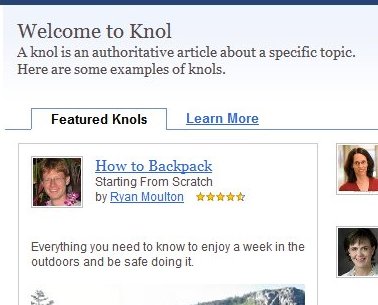Googlepedia to take on Wikipedia
Knol gives authors revenue share

Google is taking on Wikipedia with its own free online encyclopaedia, Knol. The services differ a bit though - Knol will give authors a share of the revenue from the ads displayed on their articles, which will be individually rather than collectively written.
Google wants to encourage people to contribute their knowledge to the service. Udi Manber, vice president of engineering at Google, wrote in a blog post that the new service aims to make it easier to discover information. The free tool is still in development and currently only people invited by Google can use it.
Knol, according to Google, stands for "one unit of knowledge" - it's used in the same way as you would describe other SI units such as metre, kilogram and second.
Highlight authors
Google believes the method will ensure that all its articles will be written by experts. "The key idea behind the Knol project is to highlight authors. Books have authors' names right on the cover, news articles have bylines, scientific articles always have authors - but somehow the web evolved without a strong standard to keep authors names highlighted," Manber wrote.
"We believe that knowing who wrote what will significantly help users make better use of web content...Google will provide easy-to-use tools for writing, editing, and so on, and it will provide free hosting of the content. Writers only need to write; we'll do the rest."
Like Wikipedia, Knol content will cover all topics, from scientific concepts to how-to-fix-it instructions. You'll also be able to submit comments, questions, edited and additional content, and so on. And like Wikipedia, all editorial responsibilities and control will rest with the authors - Google will not edit anything.
Advertising model
Crucially, a Knol posting may include advertising, if the author has so chosen. If this is the case, Google says it will provide the author with "substantial" revenue share from the proceeds of those ads, while also receiving a chunk of the revenue itself.
Get daily insight, inspiration and deals in your inbox
Sign up for breaking news, reviews, opinion, top tech deals, and more.
Wikipedia, on the other hand, doesn't feature any advertising - instead it is funded by donations. This has surely irritated Google for a long time, especially seeing as Wikipedia has become something of a quick first-reference stop for heaps of knowledge-hungry web users. "Competition of ideas is a good thing," Manber noted.
Google could not confirm when the service would be opened to general users.